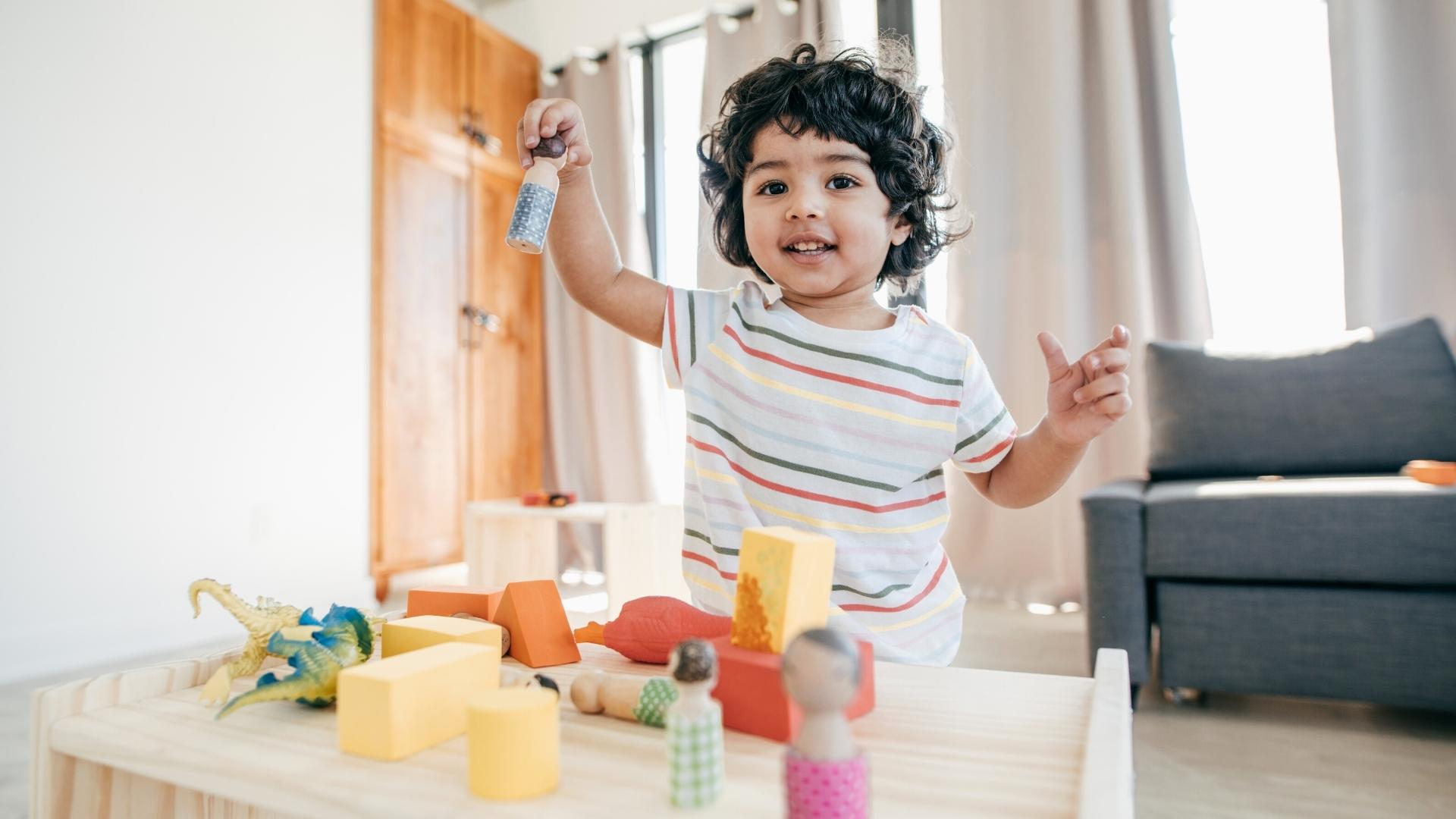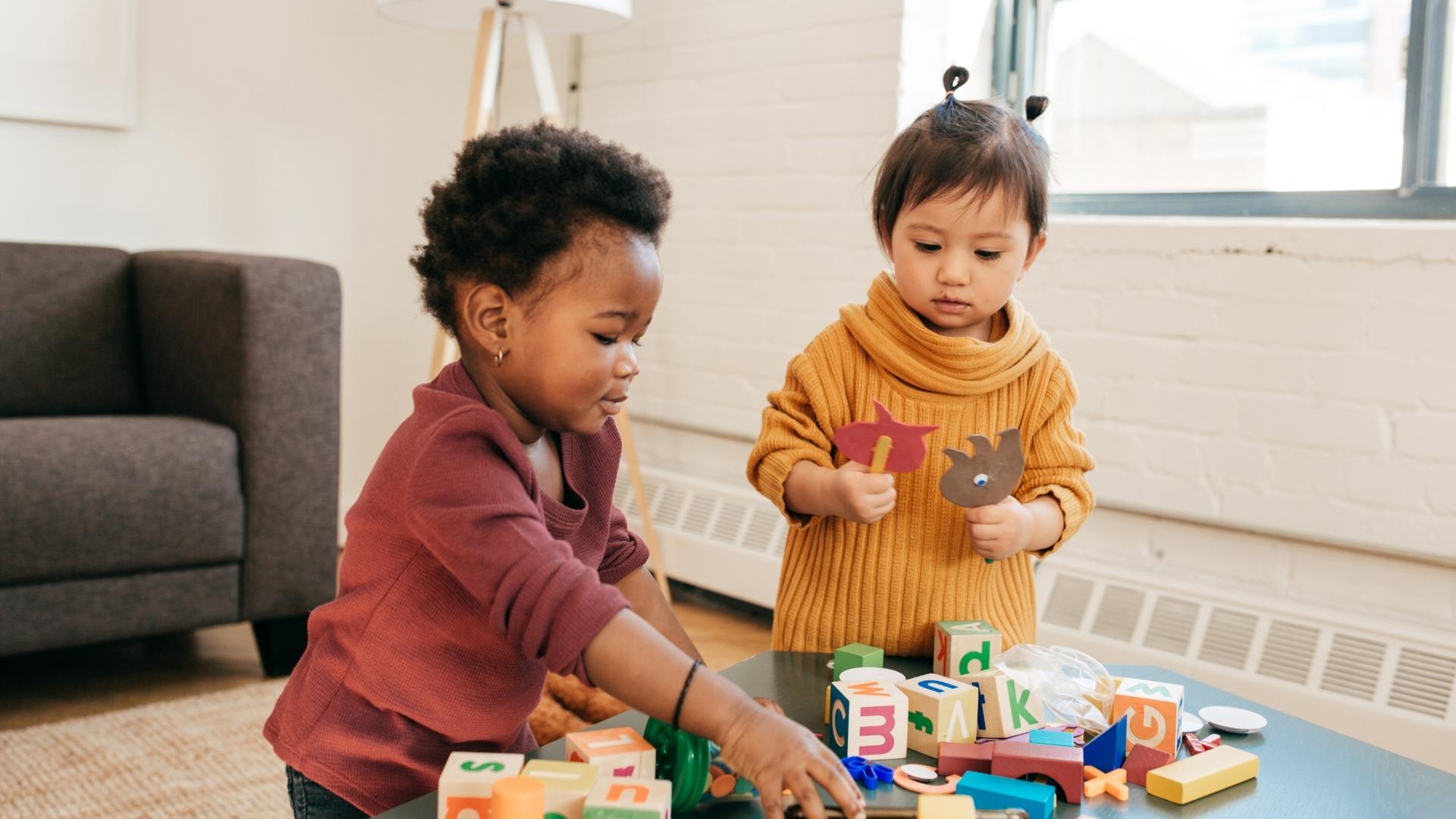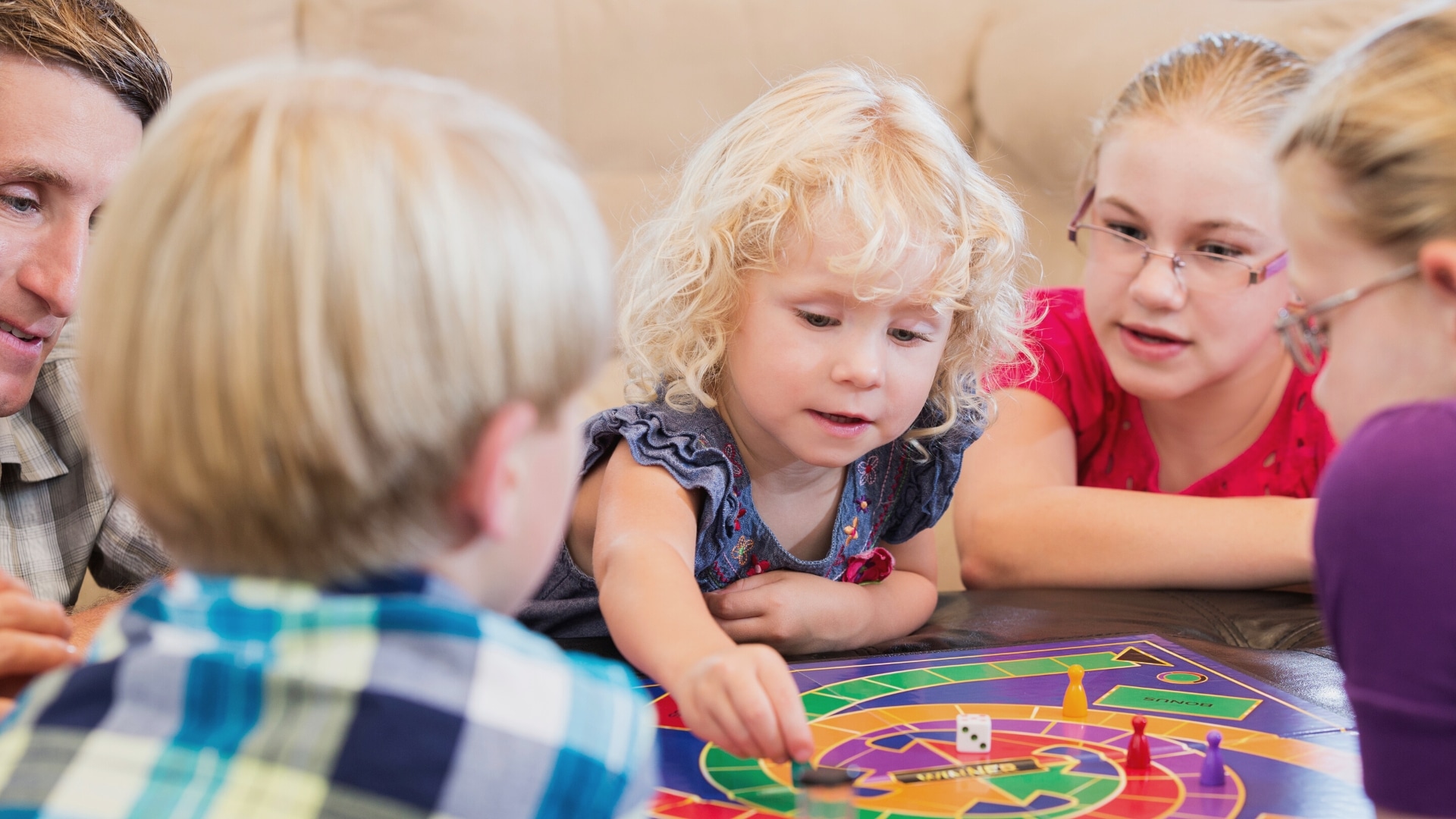In this article, we’ll break down everything you need to know about unoccupied play to ensure you and your baby get the most out of this precious time in their early months. We’ll explore what unoccupied play is, when children typically engage in this type of play, and how it differs from other forms of play.
Plus, we’ll share some examples of unoccupied play and the main benefits it offers for your child’s social development. Get ready to unlock the power of unoccupied play for your baby’s growth and well-being!
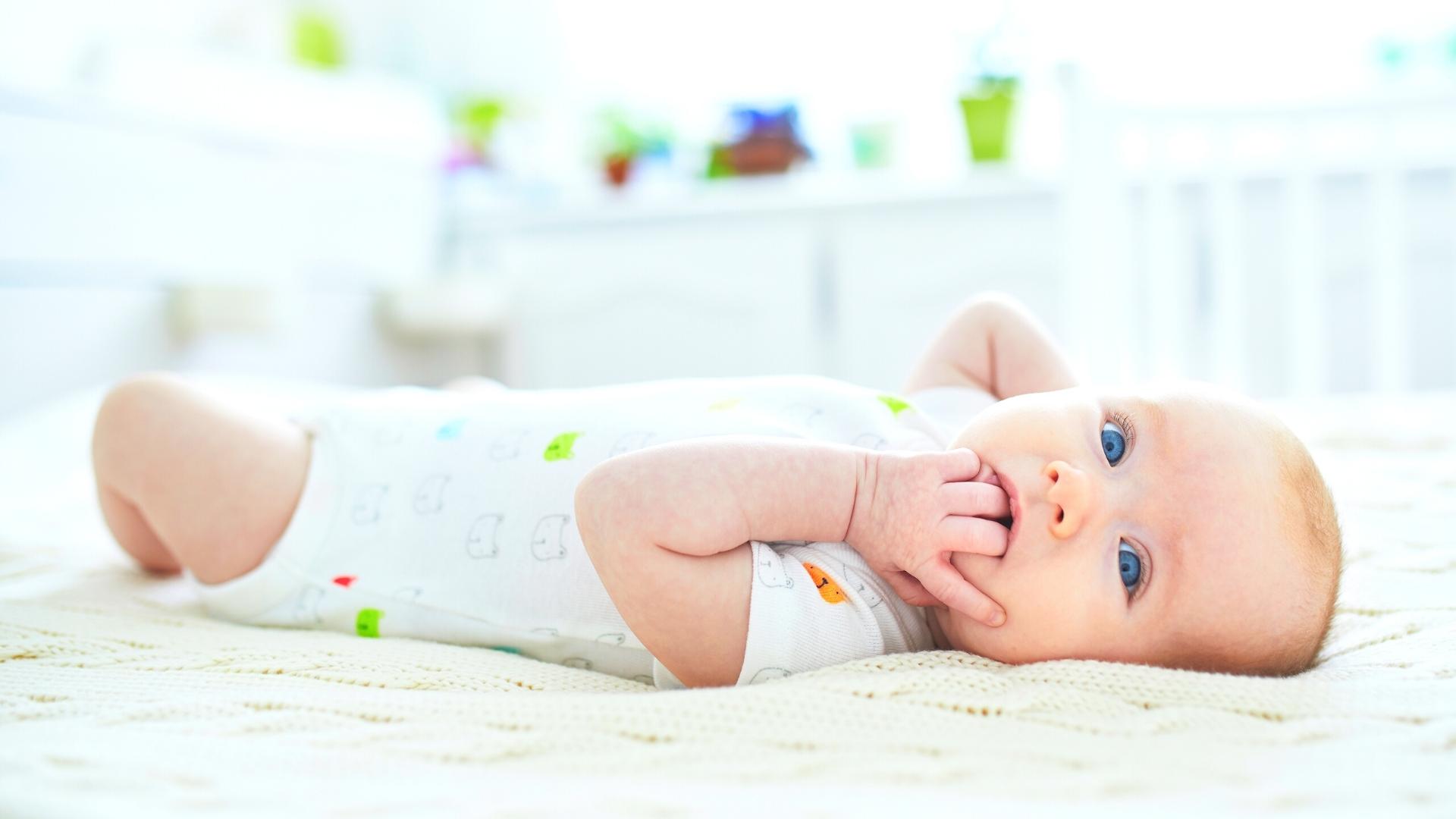
Table of Contents
What Is Unoccupied Play?
Unoccupied play is the 1st stage of play when young babies explore and learn how their bodies work through lots of arm, hand, feet, and leg movements as they discover what they are capable of doing.
Characteristics Of Unoccupied Play
Unoccupied play is a type of play where a young baby appears to be doing nothing but is actually observing and exploring their environment.
Characteristics of unoccupied play include:
- Lack of apparent purpose or common goal
- Baby is not actively engaged in any activity
- Baby may be looking around, observing, or exploring their surroundings
- Baby may be fidgeting or moving their body in seemingly random movements
- Baby will try to touch and stare at new objects, people and places.
Why Is Unoccupied Play Important?
Unoccupied play is important for babies as it allows them to explore and observe their environment without any specific goal or purpose.
This type of play encourages babies to be curious and creative, and helps them develop their cognitive skills and social skills in several ways:
- Stimulating the senses: Unoccupied play allows babies to use their senses to explore and discover their environment. This type of play can help babies develop their sensory skills and learn about the world around them.
- Encouraging independence: Unoccupied play allows babies to play independently and learn to entertain themselves without relying on others for stimulation or entertainment.
- Enhancing social skills: Although unoccupied play is typically a solitary activity for babies, it can also help them develop their social skills by observing and learning from others in their environment.
- Promoting self-awareness: Unoccupied play allows babies to become more aware of their own thoughts and feelings, which can help them develop a stronger sense of self.
- Developing motor skills: Unoccupied play can also help babies develop their motor skills as they move their bodies and explore their environment.
Overall, unoccupied play is an important part of a baby’s play repertoire as it encourages curiosity, creativity, independence, social skills, early language skills, self-awareness, and gross and fine motor development.
Unoccupied Play Age Range
Young babies engage in unoccupied play from birth to 3 months of age. Unoccupied play will lay the foundations for how every child will go on to explore the world around them, so it’s a very fundamental early stage of baby’s healthy development.
What Stage Is Unoccupied Play?
Unoccupied play is the first of six stages of play that your baby will progress through as they grow up. If you’re interested in the 6 stages of play, check out the below to learn more:
The Six Stages Of Play Recap
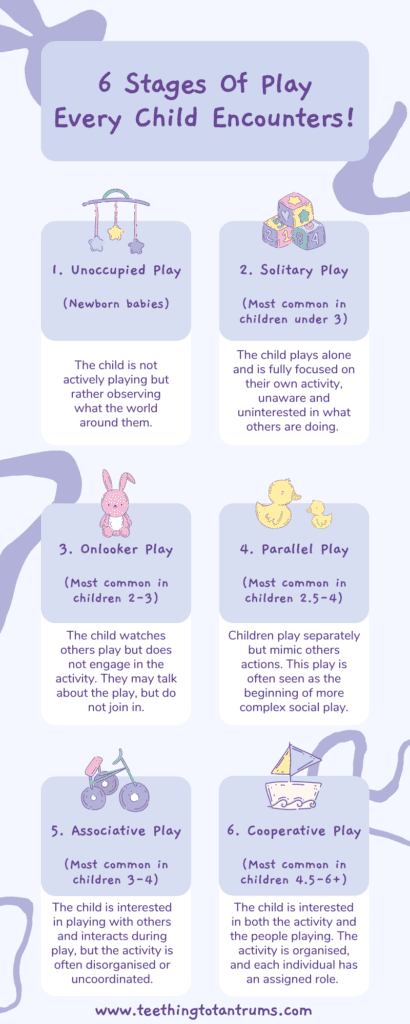
- Unoccupied Play (0-3 months)
- Solitary Play (under 3 years)
- Onlooker Play (between 2-3 years)
- Parallel Play (between 2.5-4 years)
- Associative Play (between 3-4 years)
- Cooperative Play (between 4.5-6+ years)
To learn more about Mildred Parten’s 6 stages of play, I’ve written an in-depth post talking about each stage and why they’re important for children. So be sure to check that out after reading this post here.
What Is The Difference Between Unoccupied Play And Solitary Play?
Unoccupied play is similar to solitary play but with one key difference… How they interact with the world around them.
During unoccupied play, your little one is simply exploring how their body works and observing the world around them.
But during solitary play, children will actively play with different types of toys and things in their environment. However, during neither stage will your baby engage or play with other children yet.
TOP TIP: Stages of play do not happen in isolation and will often overlap and be ever present even as your child grows up.
Unoccupied Play Benefits
Even though the unoccupied play stage looks basic and uninteresting, your baby is learning a huge amount and gaining vital knowledge by engaging in this type of play:
- Allowing your baby to learn how to hold objects and manipulate them (even if it’s their own feet!)
- Developing their gross and fine motor skills alongside their problem-solving skills.
- Encouraging your little one to learn how to reach out for objects.
- Helping them to develop strength in their legs as they kick around.
- It also gives your baby the opportunity to see what their bodies can do and begin to learn about cause and effect through exploratory movements.
- And it will give your little one the opportunity to identify what belongs to their body (i.e hands, feet, arms and legs)
After all, before children can go on to play with toys effectively, they need to understand what their body is and develop a small understanding of how it can work.
Looking to get your little one to sleep quickly and effortlessly? Check out my Bedtime and Nap Cheat Sheet and master the art of making daytime naps and bedtimes as seamless as possible.
A bedtime & nap cheat sheet so good your little one will ask you to put them to bed...
Laura Williams "This is a life saver! I'm so glad I downloaded your bedtime & nap cheat sheet. My little one actually asked me to put him to bed last night! Unbelievable! Thank you so much!"
Click Here For The FREE Cheat Sheet
How Do You Encourage Unoccupied Play?
Encouraging unoccupied play is really about giving your baby plenty of opportunities to explore and practise what their body can do.
To ensure your baby gets all the right play opportunities in the early weeks try these simple but essential activities:
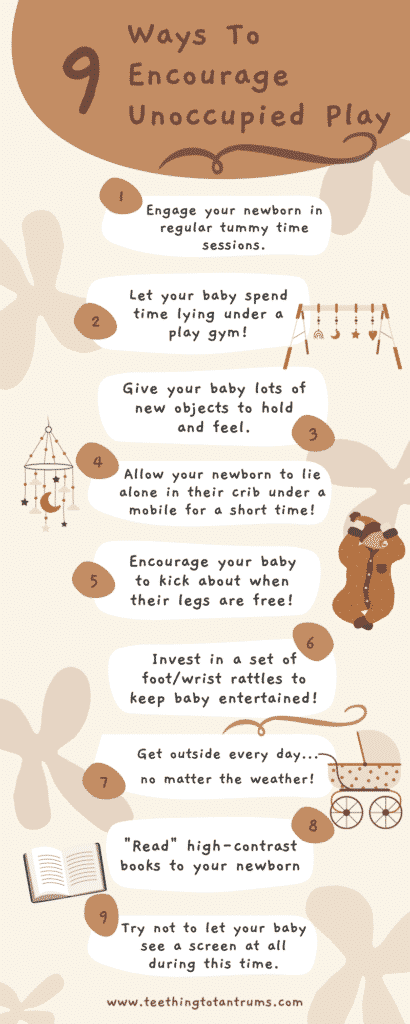
1. Engage in regular tummy time sessions. Tummy time is an amazing activity for babies as it will help to build up their strength in order to become more mobile and enter the next stage of play.
If your baby is really struggling, here are some tips to help any baby who hates tummy time.
2. Give baby time to lie under a play gym. Lying under a play gym and gazing up at the dangling toys will provide endless fun and sensory experiences for your newborn.
Leaving them to unoccupied play, you will be amazed to watch your baby follow the toys with their eyes, wonder at the sounds coming from them and even attempt to reach and touch them.
This play gym is designed by experts for baby's developing brain and body. Winner of multiple awards it includes everything you need in an activity gym-from batting to teething to learning to focus-for a whole year of play.
3. Let baby hold and feel lots of different objects. At this age, everything your baby touches and feels is a new learning experience. Offer lots of textured baby-safe objects, even some musical instruments and let your little one explore during unoccupied play.
4. Lie baby under a newborn high-contrast crib mobile. Being content by yourself is a crucial step to helping your baby learn to self-settle… So allow and encourage your baby to spend short amounts of time alone in their crib looking up at an enchanting high-contrast mobile.
This award-winning crib mobile from the trusted Manhattan Toys range is perfect for entertaining your newborns without being overwhelming. It has 10 interchangeable cards that offer a range of simple high-contrast images to more complex coloured patterns and graphics to boost your little one's visual development!
5. Encourage free kicking. Your baby will love to kick their legs freely when on the floor or changing mat. The perfect time is when changing their diaper for a few minutes, however, free kicking is also great for your baby’s gross motor development when they have no trousers on and they’re happy on the floor.
6. Allow baby to play with foot and wrist rattles. Foot and wrist rattles will provide great stimulation for your baby as they realise their movements will have an effect on the rattles.
NOTE: Be aware that some babies can find having a rattle on all of their wrists and feet overstimulating, so start with one and see how your baby likes it.
7. Spend time outside. We all know how important outdoor time is for toddlers, preschoolers and child development in general… But we sometimes forget how important it is for newborn babies too.
Full of different smells, sounds and sights, being outside will stimulate your baby’s cognitive development and help them connect to the beautiful world around them.
8. Read books together. Even though your baby cannot understand the stories, reading to babies is incredibly important. They will love to follow the high-contrast images in the books and to hear your voice encouraging them to look and follow along.
Here’s a collection of my favourite baby books if you need suggestions for your little one’s library.
9. Remain screen-free. I understand that screens are becoming a part of our lives, however, no newborn should be on a screen at all. In fact, the American Academy of Pediatrics recommends no screens under 18 months at all.
Best Toys For Unoccupied Play
Below are some of my top toys to help encourage your newborn baby to engage in unoccupied play:
1. High Contrast Cards. One of my favourite toys to boost cognitive and visual development through unoccupied play are high-contrast cards. Buying cards that will last for a while is always a worthwhile investment.
Designed to stimulate your baby's senses with high-contrast colours and textures, these safe and easy-to-clean flash cards are perfect for newborn play sessions up to 36 months of age. Give your little one the gift of early learning and exploration today and watch them thrive!
2. Baby Safe Mirror. Perfect to develop baby’s self-awareness, visual tracking and even their gross motor skills whilst they reach out to their reflection, a quality baby-safe mirror will complement every unoccupied play session.
We all know the importance of tummy time and there is no better way to keep your baby engaged during this essential activity than with a tummy time mirror. This one from Sassy is sturdy but soft and has a large good quality mirror that is guaranteed to grab baby's attention. It also comes in a black and white colourway.
3. Play Gym. Designed to stimulate your baby with a multitude of textures, sounds and hanging toys, your baby’s unoccupied play will benefit hugely from having a well-designed baby play gym to lie underneath. Like this one from Lovevery:
This play gym is designed by experts for baby's developing brain and body. Winner of multiple awards it includes everything you need in an activity gym-from batting to teething to learning to focus-for a whole year of play.
4. Foot And Wrist Rattles. With fun designs, exciting noises and soft textures, a must-have toy for unoccupied play are foot and wrist rattles. Designed to encourage your baby to reach out and play with their feet, their spacial awareness and motor skills will develop every time they wear them.
You can watch them delight when they realise that they are the ones making the noises happen when they move too.
The Bloobloomax Wrist and Foot Rattles provide a colourful and engaging way to stimulate your baby's senses and promote cognitive development. With their high-contrast colours and textures, these rattles are designed to capture your baby's attention and encourage exploration. Suitable for babies from 0-12 months, these rattles are made from safe, non-toxic materials and are easy to clean making them the perfect playtime companions.
5. Textured Toys. Finally, one of the best toys for unoccupied play are textured toys. Whether it’s balls, books or rattles, your newborn baby will love and benefit from having a variety of endless developmental opportunities to learn about how to grasp, shake and feel different textures.
Looking for a fun and safe sensory toy for your baby? Look no further than the Manhattan Toy Winkel Sensory Teether. With its unique design and multiple textures, this teether is perfect for soothing sore gums and promoting sensory development. Made from safe, non-toxic materials, the Winkel Sensory Teether is easy to clean and perfect for babies of all ages.(Whether they're teething or not!)
Need More Parenting Help?
- Download our FREE Bedtime & Nap Sleep Cheat Sheet. It’s a free, easy-to-use and proven formula designed for parents of 0-5 year olds to master the art of consistently undisturbed and restful sleep without the yelling, nagging or exhausting long-winded evenings.
- Check out our Parenting Toolbox. You’ll get access to expertly-chosen products that you can guarantee are the best for your little one and your wallet.
- Are you looking for personalized guidance to navigate the challenges of parenting? I offer 1-on-1 consultations to bring you tailored strategies and actionable advice to help support your child's growth and well-being with confidence.

A bedtime & nap cheat sheet so good your little one will ask you to put them to bed...
Laura Williams "This is a life saver! I'm so glad I downloaded your bedtime & nap cheat sheet. My little one actually asked me to put him to bed last night! Unbelievable! Thank you so much!"
Click Here For The FREE Cheat Sheet






